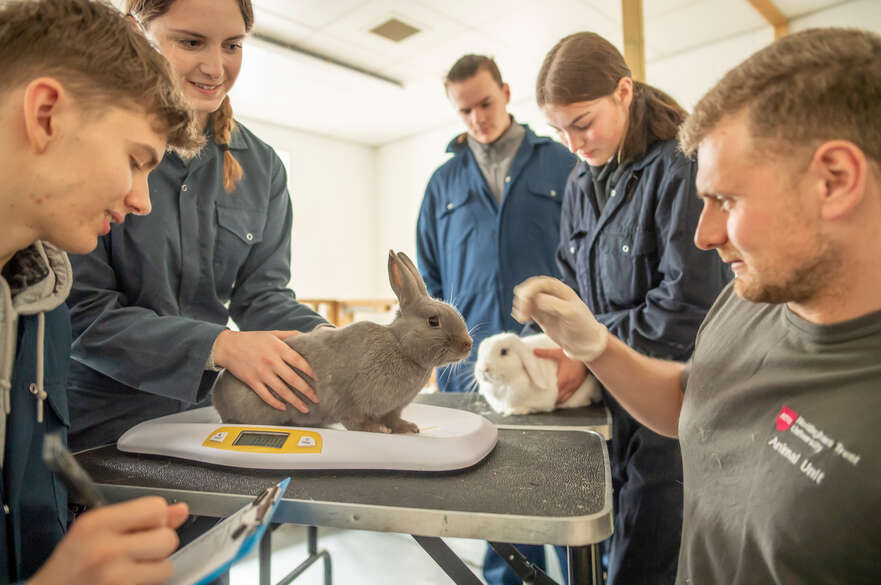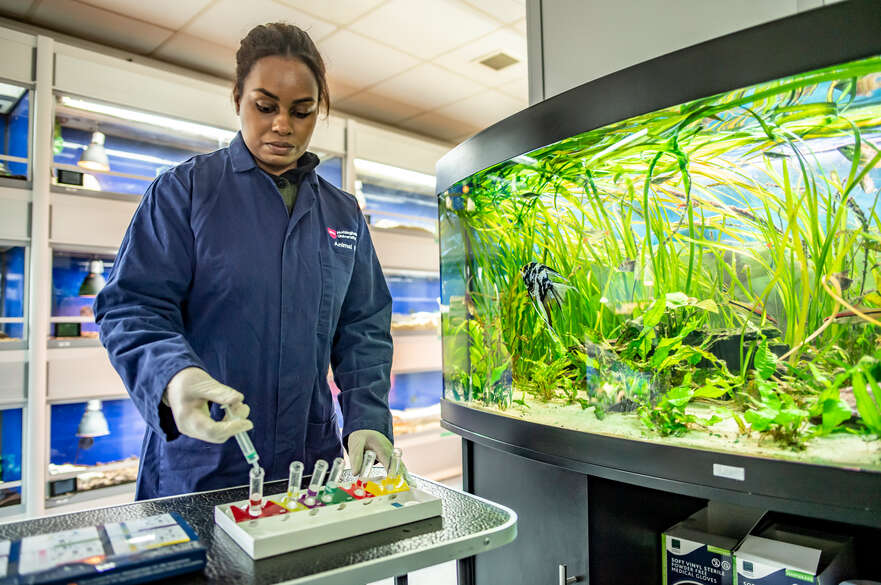About this course
Learn about animal-related subjects, including biology, health, nutrition, behaviour and breeding. You’ll also develop practical skills for handling and caring, and gain the knowledge needed to start your career within the animal industry, or for further study.
What you’ll study
You'll take part in practical hands-on lessons and learn about a wide range of animals, using our fantastic facilities. You'll also develop knowledge and skills about animal-related subjects and have the chance to go on trips to different locations to learn about the animal industry.
Animal Biology
In this module, learners will understand the structure and function of skeletal systems and sensory organs and how these have been adapted to meet the needs of animals living in different environments.
Animal Health and Disease
In this module, learners study to recognise the signs of good and ill health in animals and to carry out health checks on animals and produce animal health plans.
Animal Behaviour
In this module, learners will develop knowledge and skills to interpret animal behaviour and understand the factors which influence such behaviour.
Practical Animal Husbandry
In this module, learners study how to handle and care for a wide variety of domestic and companion animals.
Exotic Animal Husbandry
In this module, learners will understand about health, welfare, handling, restraint, nutrition and feeding in exotic animals in captivity.
Animal Welfare and Ethics
In this module, learners will study about the ethics, regulations and legislation associated with animal welfare in animal-related industries.
Work-Related Experience in the Animal Sector
In this module, learners will develop important knowledge and skills that relate to employment in the environmental and land-based sector.
Animal Breeding and Genetics
In this module, learners study the science of genes and genetic factors influencing the management of breeding animal. Learners will develop skills to evaluate and care for breeding stock and offspring.
Investigative Research Project
In this module, learners study the principles and purpose of research in the animal sector and develop skills needed to conduct their own small -scale research project.
Principles of Animal Nursing
In this module, learners will explore the work of a veterinary practice, including staff roles, responsibilities, procedures and basic nursing skills.
Zoological Animal Health and Husbandry
In this module, learners study the specialist husbandry skills needed to work with zoo collections, including accommodation, safe handling methods and maintenance of animal health and welfare.
Human and Animal Interaction
In this module, learners will develop their skills in animal training, learners will design and implement a training programme to meet a desired goal.
In addition to the core modules above, you will follow one of our two specialist pathways:
Welfare pathway*
Animal Boarding Establishments
In this module, learners study the range of animal boarding establishments available to support the demands of customers, reflecting ever changing lifestyles.
Farm Livestock Husbandry
In this module, learners study the breadth and purposes of farm livestock in the UK, including husbandry techniques required to maintain animal welfare and productivity.
Developing an Enterprise in the Animal Management Sector
In this module, learners will develop their knowledge and study the practical skills needed to set up an new enterprise In the animal sector.
Science pathway*
Wildlife Ecology and Conservation Management
In this module, learners study the methods and skills needed to investigate habitats and to carry out wildlife habitat improvements and wildlife rehabilitation.
Animal Metabolism
In this module, learners study the biochemical basis of metabolic reactions in animals.
Advanced Animal Nutrition
In this module, learners study the biological molecules essential for animals to survive and how animal nutrition can be practically managed for optimum health, welfare and performance.
Practical Skills in Animal Science
In this module, learners develop the practical skills necessary to carry out and report on scientific investigations in the laboratory.
*modules subject to change
We regularly review and update our course content based on student and employer feedback, ensuring that all of our courses remain current and relevant. This may result in changes to module content or module availability in future years.
Don’t just take our word for it, hear from our students themselves
Video Gallery
How you're taught
You’ll learn in our fantastic facilities and be taught by tutors who have real-life experience of working within the animal industry. You can expect the course to be split so that approximately 30% is practical work and 70% is theory work. You’ll be taught through lectures, group discussions and practical demonstrations. You’ll also get to go on trips to different locations, including Crufts Dog Show at the National Exhibition Centre, Twycross Zoo and Yorkshire Wildlife Park.
The course includes a work placement. This allows you to develop your skills and knowledge in the animal industry, and looks good to future employers. You can work at places like Cats Protection, Twycross Zoo, RSPCA, Nottinghamshire Wildlife Trust, Stonebridge City Farm and more.
How you’ll be assessed
You’ll be assessed through a portfolio of evidence and external written assignments, practical assessments and exams.
Careers and employability
After completing this course there are a number of options and routes that you can take. You could choose to continue your studies and go onto a higher education course or pursue a career in an animal-related industry.
Future jobs within the animal industry include:
- Animal Carer Assistant- you can earn up to £21,000
- Welfare Assistant - you can earn up to £21,000
- Veterinary Nurse - you can earn up to £25,000
- Laboratory Assistant - you can earn up to £23,000
- Industry Sales Person - you can earn up to £27,000
Higher Education
Our animal courses have great progression routes to further study. You can even study one of NTU’s degrees right here at Brackenhurst, including FdSc Veterinary Nursing, BSc (Hons) Animal Biology or BSc (Hons) Zoo Biology.
Placement opportunities
Work placements are a great way to broaden your knowledge and skills. You will have the opportunity the take part in work experience in a range of different animal related sectors.
With our great links with industry you'll have the opportunity to work in areas such as:
- Veterinary Centres
- Boarding Kennels
- Rescue Centres
- Catteries
- Zoo's
NTU Enterprise
You'll also have the opportunity to turn your ideas into a viable business with help from NTU Enterprise, NTU's purpose-built Centre for Entrepreneurship and Enterprise, a support centre to help students create, develop and grow their own businesses.
Campus and facilities
Study an animal course at Brackenhurst and you’ll have access to some fantastic facilities.
Our specially designed Animal Unit is home to over 250 animals from around 70 different species. These include small animals such as rabbits, cats, dogs, reptiles and birds, as well as larger animals like goats and donkeys. All our animal courses include hands-on, practical lessons at the unit. You’ll also help our technicians to care for the animals on a day-to-day basis.
As well as your subject-specific facilities, you’ll also find:
- a library, including fully equipped computer rooms
- modern classrooms and teaching areas
- laboratories
- our careers and employability service
- a dining room and Costa Coffee
- our student shop
- a common room.
Entry requirements
UK students
For 2025 entry you'll need:
- Four GCSEs at grade 4 / C or above including:
- Science
- Maths or English language (with the other subject at grade 3 / D or above).
- If you do not yet have a grade 4 / C in English language or maths you will need to complete GCSE retakes as part of your study programme.
A Level 2 Technical qualification or other equivalent qualifications will be considered.
You will also be required to attend an interview.
Additional requirements for UK students
There are no additional requirements for this course.
International students
We welcome applications from international students who do not require a student route visa. Please email our FE Team or call on +44 (0)115 848 5299 to discuss how your qualifications match our course requirements.
Additional requirements for international students
There are no additional requirements for this course.




